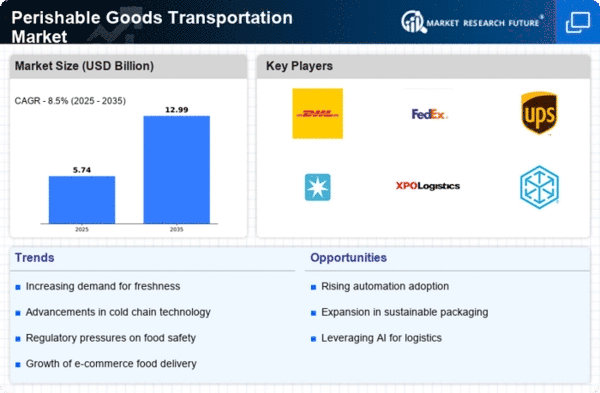Top Industry Leaders in the Perishable Goods Transportation Market

The perishable goods transportation market is a dynamic force, constantly evolving to keep pace with the ever-growing demand for fresh produce, pharmaceuticals, and other time-sensitive commodities. This complex ecosystem boasts a diverse range of players, each employing unique strategies to carve their niche and secure a slice of the market pie.
Strategies Fueling Market Dominance:
-
Investing in Technology: Leading players like Maersk and DHL are leveraging AI-powered logistics platforms and real-time tracking systems to optimize routes, minimize spoilage, and enhance efficiency. This tech-driven approach allows for faster delivery times and reduced costs, giving them a significant edge. -
Specialization is Key: Companies are increasingly focusing on specific segments within the market. For example, Cold Chain Technologies specializes in temperature-controlled transportation for pharmaceuticals, while Fresh Del Monte excels in refrigerated cargo for fruits and vegetables. This targeted approach allows for deeper expertise and tailored solutions, catering to the unique needs of different perishable goods. -
Sustainability Takes Center Stage: With growing concerns about environmental impact, companies are adopting eco-friendly practices like utilizing electric vehicles, optimizing packaging, and reducing carbon footprint. This not only aligns with consumer preferences but also opens up new opportunities in green logistics. -
Building Partnerships: Collaboration is becoming a crucial strategy. Airlines partner with ground transportation providers to ensure seamless delivery, while logistics giants like C.H. Robinson connect shippers and carriers through their digital platforms. These partnerships create a robust ecosystem that benefits all stakeholders.
Factors Shaping Market Share:
-
Geographical Location: Proximity to production and consumption centers plays a vital role. Companies with strong regional networks and efficient distribution channels have a distinct advantage. -
Infrastructure Development: The quality of roads, ports, and cold chain facilities directly impacts transportation efficiency and cost. Countries investing in infrastructure upgrades are attracting major players and boosting their market share. -
Regulatory Frameworks: Stringent regulations governing food safety and temperature control can create barriers to entry for smaller players. Companies with established compliance procedures and certifications gain an edge. -
Consumer Preferences: Rising demand for organic and locally sourced produce is driving the need for shorter supply chains and transparency. Companies that can adapt to these changing preferences are well-positioned to thrive.
Key Companies in the Perishable Goods Transportation market include
-
Africa Express Line Limited
-
Bay & Bay Transportation
-
C.H. Robinson Worldwide Inc
-
CMA CGM Group (MERIT France SAS)
-
DB Schenker
-
Deutsche Post AG
-
FST Logistics Inc
-
Hapag-Lloyd AG
-
Hellmann Worldwide Logistics SE
-
K Line Logistics Ltd (Kawasaki Kisen Kaisha Ltd)
Recent News
-
October 2023: A California-based startup, Apeel Sciences, secures USD 100 million in funding for its edible plant-based coating that extends the shelf life of fruits and vegetables, disrupting traditional packaging solutions. -
November 2023: European Union regulators propose stricter temperature control regulations for refrigerated trucks, aiming to minimize spoilage and improve food safety standards. -
December 2023: The United Nations Food and Agriculture Organization (FAO) launches a global initiative to promote sustainable practices in perishable goods transportation, aiming to reduce greenhouse gas emissions and combat climate change.










